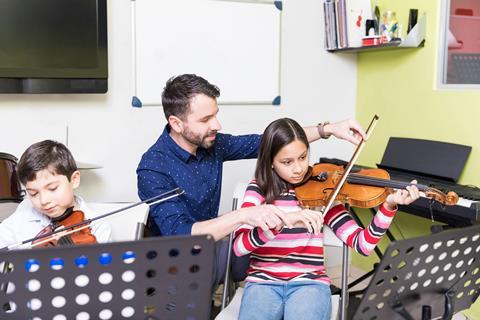Cellist and teacher Naomi Yandell is often pleasantly surprised at how much progress can be made by students during a break from lessons

Discover more Featured Stories like this in The Strad Playing Hub
Read more premium content for subscribers here
Sometimes it can be surprising to a teacher just how quickly the terms seem to pass once they’re in the thick of their teaching routine. Weeks seem to whizz past in a blur and suddenly the holidays lie on the horizon. What a relief, they might think – so ready are they for a break. It has all been that bit intense. This gets me thinking about how teachers can be tempted to consider the holidays from a personal point of view, as a time to get a generally needed good rest and reset. But what of the students?
At the beginning of this term, I received a letter from a student’s mother. She wrote: ‘She had a great time at junior orchestra! Thank you for the recommendation. She can’t wait to go back again.’ She is already booked in for the Christmas course, I gather. There is no orchestra at school so this was clearly a real highlight for her.
When she returned from the first course, she was a different player. OK, her technique had suffered a bit, but she was bursting with enthusiasm and her sightreading and general fluency had improved greatly. After a week or two we were back on track, and she had it in mind that she might be able to advance to a higher group when she next attends the orchestra course, so she was motivated to practise harder and more often.
I was recently chatting about holiday courses to another cello teacher. He was opining that we all fail sometimes as teachers, and that if we can’t always get the message across to our students then someone else relaying it in a different way can be extremely helpful. He had been struggling for ages to correct a student’s left-hand elbow. Nothing he said seemed to make any difference until one day, after the holidays, she came in and played with it in the perfect position. How? Why? Apparently, she explained, her chamber coach had told her how to do it. He was intrigued. What had the coach said? The student was vague, but that seemed somewhat irrelevant, since it had worked.
A period of absolute rest for a student is also valid and may be beneficial in some cases
A period of absolute rest for a student is also valid, of course, and may be beneficial in some cases. Students return with a clear head, and, particularly over longer holidays, they can benefit from a period of processing material from the previous term. On returning, they are often rusty, but after a week or two they have rediscovered their previous form, and more. This effect is amplified with younger students, who have not only assimilated what they have learnt the previous term, but have usually grown considerably, and can manage to do things that haven’t been possible before for developmental or physical reasons. It is quite astounding how much younger students can grow in a short time and how helpful this can be. It might even mean a move to a larger instrument with all the excitement of the attendant improvement in sound (and a new varnish colour!).
What a student does in the holidays is up to them, of course, and to their parents. However, as a teacher, I do like to suggest possible activities, whether it be the occasional optional lesson, a chamber or orchestral course, or an opportunity for students to try something else entirely, such as djembe drumming or singing in a choir.
I find chamber music to be the greatest motivator. Talking of which, I had another email at the beginning of term: ‘He loved playing in the quartet. He has been practising a lot during the holidays and I am loving playing duets with him.’ This was music to my ears.
Whatever path a student has chosen to take during holiday time, it is more than likely to have enhanced their musical experience and/or dexterity in a way that their teacher can build on in the term ahead.
Listen: The Strad Podcast Episode #40: Naomi Yandell on teaching beginner bow holds
Read: Opinion: The pros and cons of backing tracks
Discover more Featured Stories like this in The Strad Playing Hub
Read more premium content for subscribers here
The number one source for playing and teaching books, guides, CDs, calendars and back issues of the magazine.
In The Best of Technique you’ll discover the top playing tips of the world’s leading string players and teachers. It’s packed full of exercises for students, plus examples from the standard repertoire to show you how to integrate the technique into your playing.
The Strad’s Masterclass series brings together the finest string players with some of the greatest string works ever written. Always one of our most popular sections, Masterclass has been an invaluable aid to aspiring soloists, chamber musicians and string teachers since the 1990s.
American collector David L. Fulton amassed one of the 20th century’s finest collections of stringed instruments. This year’s calendar pays tribute to some of these priceless treasures, including Yehudi Menuhin’s celebrated ‘Lord Wilton’ Guarneri, the Carlo Bergonzi once played by Fritz Kreisler, and four instruments by Antonio Stradivari.













































No comments yet